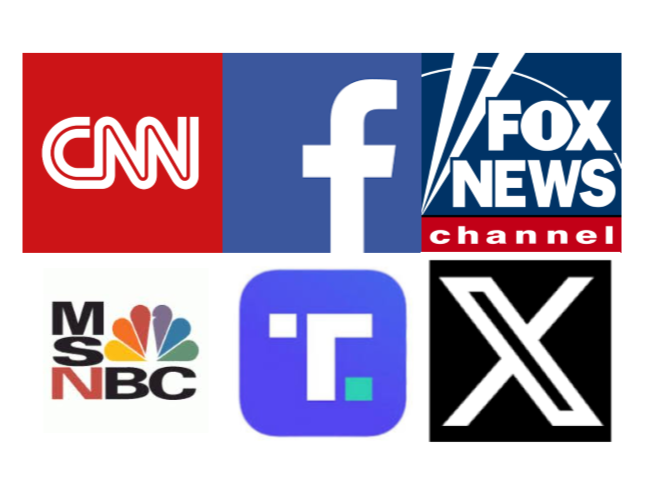Doomscrolling
Between your phone, TV, tablet and laptop it is so easy to be on informational overload. This behavior is sometimes called doomscrolling because most likely what you are reading or watching may all be negative. There are a lot of negativities in the world right now.
Recognizing Informational Overload
How do you know if you are informationally overloaded? How many of the following sound like you?
- Using four or more social media platforms (X, TikTok, Snapchat, Instagram, Facebook, Pinterest, etc.)
- Feeling compelled to check your phone every few minutes
- Being on social media for an hour or more per day
- Visiting social media sites 30 or more times per week
- Being preoccupied with the like, comment, or reshare counts on your social posts
- Scrolling is your way of self-soothing and unwinding from the day
- Feeling anxious or stressed out if you can’t find your phone
- Being depressed, anxious, or angry after spending time on social media
- Experiencing FOMO, or fear of missing out
Home-Work Boundaries
Work-home boundaries are frequently blurred when you continue to interact with colleagues at work long after you have left work. Feeling you must always be connected to work can make it difficult to create and enforce boundaries between your home and work life. For some people, it can be hard to resist the temptation to check emails, respond to a text from a colleague, or check in on your social media accounts.
It is bad enough when you as a supervisor make the decision to stay connected. Unfortunately, some supervisors expect their supervisees to respond after hours, too!
Social Media Comparisons
A phenomenon called social image crafting occurs when someone compares themselves to someone else on social media. Anyone spending 5 minutes on any social media platform will see people talking about their massive trip, their house renovations, their weight loss, all of the wonderful things in their life. Their hair and make-up are perfect, the clothing the most stylish, drinks dripping in sweat in the bright sunshine and the bright green grass with absolutely no weeds. You know the pictures!
Then you compare the posted picture with the air brushed, perfect angle of perspective, color and shadowing that was probably chosen as the best from 25 taken, with your one-bite-at-the-apple, chaotic real-life photos/life. It is hard to beat perfection, especially when it doesn’t exist.
Detoxing from your phone and your social media connections may be a good way to focus on what is really important to you.
Eliminate or Cut Back?
If you feel like you are overly involved with your phone or laptop, you could consider cutting back or eliminating your electronics usage. However, it is probably more realistic for you to cut back. The following are some of the less painless ideas for cutting back on your electronic overload:
- Schedule Time Away from Screens Throughout the Day
It may be hard to do, especially if your work includes a computer. So time doesn’t get away from you, set an alarm on your phone to remind you to get up, take a stretch and hydrate. - Downgrade Your Phone
If you are having trouble staying present, eliminate the distractions by replacing your smartphone with a simpler cell phone that cannot support apps. - Turn Off Your Phone at a Specific Time
Try powering down before dinner and until the next morning. Apple and Android users can enable do-not-disturb settings that can silence alerts, notifications, and calls. - Create No-Phone Areas
Banning phones and screens from the bedroom, for instance, can keep screens from interfering with your sleep. Or no cellphones at the dinner table. - Do a Digital Fast
Try giving up all digital devices for a short period of time. Start with an hour and work up to a day or a week. - Do a Specific Detox
If one app, site, game, or digital tool is taking up too much of your time, focus on restricting your use of that problematic item. - Do a Social Media Detox: Focus on restricting the number social media platforms you follow or even completely eliminating your social media use for a specific period of time.
The Benefits of a Digital Detox
Unplugging yourself from your devices or making the effort to use them less can help improve your quality of life by helping you:
- Relax and feel more content
You are not comparing yourself to others. You have more time for things you may enjoy, for example, reading. You are more present in conversations with others. - Be more productive
Every minute you spend scrolling is a minute you are not doing something for yourself or socializing with others. - Improve your self-esteem
If you are not comparing yourself to others on social media, you may be able to see all of the things you do well. - Be more active
Scrolling isn’t good for your posture or your eyes! It prevents you for being active, for example, taking a walk. Disconnecting is good for all of you! - Improve your sleep
Reading something distressing just before bed can delay the release of melatonin, the natural way to fall asleep.
Set Limits
While it isn’t always possible or even preferable to completely disconnect, setting limits on when these digital connections are allowed to intrude on your time can be good for your mental well-being. For example, you might want to use your phone to play your Spotify or Apple Music playlist while you are working out, but setting it to airplane mode will make sure that you aren’t distracted by phone calls, texts, other messages, or app notifications during your workout.
Other times when you might want to limit your digital device usage include:
- When you are eating meals, particularly when dining with other people
- When you are waking up or going to bed
- When you are working on a project or hobby
- When you are spending time with friends or family
- Before you go to sleep each night
Relationships Relearned: Learn. Unlearn. Relearn
To be in a healthy, successful relationship, what you learned in childhood about relationships may need to be unlearned and relearned in a different way as an adult.
In childhood, by watching your parents and friends become fixated by their phones, you may have learned scrolling is a way of self-soothing and staying connected. This may even be to the point of not knowing how to have a face-to-face conversation!!!
You may have to unlearn that tactic of entertaining yourself!
And then, relearn healthier ways of self-soothing, for example, any of the suggestions in this blog.
Take Away
A digital detox may be very helpful in improving your physical and emotional health. A digital detox can also help you improve your relationships with others.
With warmest regards,
| AI has not been used to create any content for my website, articles, blogs or books. All material is original unless otherwise noted. All photos and graphics within my website and blogs were taken or created by David Harrington or Kathryn Maietta. |
Thank you so much for reading this blog. If you enjoyed the content, please check out other blogs at:
https://relationshipsrelearned.com/my-blog/
https://rvingnomads.com/blog/
You can view my series of books on my Amazon Authors Page or go to the books tab at the top of this page
To be notified of future posts, please enter your email address and click on the Subscribe button.












